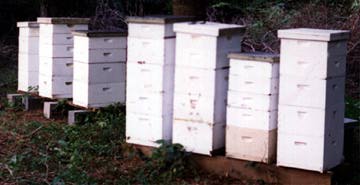

Welcome to my Apiary. Keeping Honey bees has been a hobby of mine
for several years now. I used to keep my hives behind my greenhouse
until a neighbor complained that my bees were "buzzing and stinging"
her while she was out on her deck behind her house. She claimed
they were flying around their food when they were trying to picnic
there. She also tried to tell me that her neighbor beyond her
said they were getting into her house and chewing up the drywall!!
Now unless my bees have mutated and become the scourge of the earth,
This neighbor couldn't possibly have been talking about my Honey Bees.
Honey bees won't try to collect any type of food unless it contains
sugar. And if given the choice between pure sugar or 90 percent
sugar syrup and necter, the bee will go for the necter every time!
Ironically, the lady called me over to the fence to discuss this
while I was checking on my bees. I was dressed in nothing but a
pair of shorts! I didn't have on a shirt, shoes or anything
covering my legs. Alas, there was no arguing or convincing this
lady. She was sure it was my bees that were behind all this
mischife. In order to keep the peace in the neighborhood, I took
my bees to a friends farm in the foothills of the Shanandoah
Mountains.
I later found out that this very same neighbor asked
another neighbor to cut down a bush in
his backyard because it drew a lot of bees when it was in flower.
Obviously this lady had some kind of phobia about bees, and I
respect that. I'd have a fit if a neighbor of mine had boxes filled
with thousands and thousands of SPIDERS!!!!
Ignorance can be bliss sometimes, but more times than not, it keeps
us from enjoying some of the most wondrous and fascinating
experiences life has to offer. There are Thousands of different
kinds of bees in the world and only one of which produces honey in
quantities large enough to make it worth while to harvest. That bee
is known as the Italian Honey Bee, or Apis Mellfera. The bees
my neighbor described may have been the pesky ground dwelling yellow
jacket. They scavenge for all kinds of food stuffs including meat
and anything with the least bit of sugar in it. In fact, they are a
mortal enemy of the honey bee. A yellow jacket will rob a bee hive
of it's precious honey and kill any honey bee in its way. In fact,
I have watched one kill a honey bee, dismember it's body, and take
the nutritious parts back to its den. Another enemy of the honey bee
is one of the many different kinds of bumble bees that are indigenous
to the United States. It is fascinating to watch one of these
Bumbles hover motionless over the hive, waiting for one of my honey
bees to fly by, then like a cat in ambush, it takes off after the
honey bee faster than a streak of lighting! I must admit, I've never
seen one of these bumbles catch one of my bees, but they must have
some success or you would think they would give up! A cousin to this
Bumble bee is the carpenter bee, which must have been the bee that
ate through that ladies dry wall. Carpender bees chew holes in old
wood, where they lay an egg and raise their young.

Let me share with you some of the things about bee keeping that
I find so fascinating:
 The Honey
The Honey
 The Wax
The Wax
Want to learn more about insects in general? Check out
The Wonderful World of Insects

 Send E-Mail to orchids00001@yahoo.com
Send E-Mail to orchids00001@yahoo.com


For more information on this web page please contact Web
Master Andy at:
orchids00001@yahoo.com
Home page URL:http://geocities.datacellar.net/RainForest/3297/index.html
© 1996


Garden Page Award


 The Honey
The Honey
 The Wax
The Wax

 Send E-Mail to orchids00001@yahoo.com
Send E-Mail to orchids00001@yahoo.com




